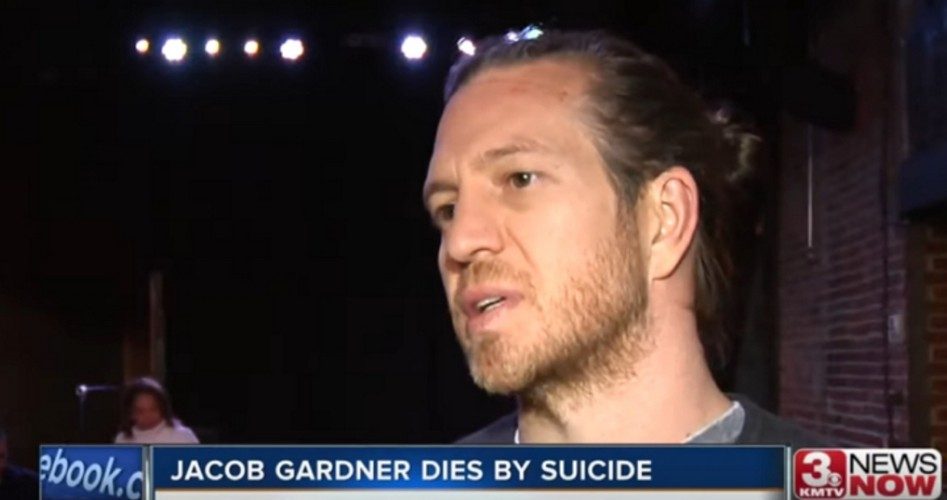
Podcast: Play in new window | Download ()
Subscribe: Android | RSS | More
The former Marine who shot and killed a Black Lives Matter “protester” in self defense has committed suicide, yet another victim of a new rule in major cities in the grip of BLM terror: A white man cannot defend himself or his property, no matter the circumstance.
Jacob Gardner, a Purple Heart recipient and veteran of the Iraq War, shot himself in Portland on Sunday, five days after a grand jury in Douglas County, Nebraska, indicted him in the death of BLM attacker James Scurlock.
On May 30 during the BLM riot in Omaha, Scurlock and two other thugs attacked Gardner and his father outside the younger Gardner’s bar in Omaha.
The chief prosecutor decided not to charge Gardner, but then surrendered to BLM pressure and petitioned a judge to appoint the special prosecutor who convinced a grand jury to indict the veteran.
Apparently, he knew what was coming. The country for which Jake Gardner went to war permitted the radical Left to declare war on Jake Gardner.
He couldn’t take it. And so he killed himself.
The Shooting
Democrat prosecutor Don Kleine, the Douglas County District Attorney, announced he wouldn’t charge the former Marine after a thorough review of the evidence, as the Omaha World Herald reported at the time.
Video showed 22-year-old Scurlock and another vandal on a rampage in an architecture firm, the newspaper reported, and Scurlock’s partner in crime attacking Gardner’s father after he rushed outside when the mob smashed the bar’s windows. The combat vet rushed to his father’s defense and ordered the mob to move away.
Then came the BLM attack on Gardner:
Walking backward, with Scurlock and another man approaching, Jake Gardner lifts his shirt to show a gun in his waistband. He soon pulls it out and holds it down to his side.
In one video circulating online, a cellphone user says: “That (expletive) got a gun.” Someone in Scurlock’s group waves at Gardner, as if shooing him away. “It’s not worth it (expletive) you stu–,”
Two seconds before 10:58: Gardner is tackled from behind by an Omaha woman, Alayna Melendez. He ends up on his back in a puddle in the middle of Harney Street.
10:58: Gardner pulls out his gun and fires two shots into the air.
Four seconds later, Scurlock jumps on Gardner from behind as he is attempting to get up. Authorities allege that Scurlock was on Gardner’s back and placed Gardner in what authorities alternately described as a headlock or chokehold. Gardner can be heard yelling, “Get off me, get off me,” Kleine said.
His right arm pinned, Gardner switches his handgun to his left hand. He fires over his shoulder, killing Scurlock. The struggle lasted about 20 seconds.
After reviewing the video and witness statements with homicide detectives, Kleine told the newspaper, “there was a consensus that the actions of the shooter were justified.”
Such was Kleine’s confidence in the decision that he condemned a leftist congressional candidate for calling the shooting “cold-blooded murder.”
Charge Him Anyway
Of course, Scurlock’s defenders claimed “there was a rush to judgement” and pushed for a special prosecutor and grand jury to review the case.
They got what they wanted.
The special prosecutor, who is black, told the newspaper last week that “there is evidence that undermines” a self-defense claim that “comes primarily from Jake Gardner himself.”
And so the grand jury charged Gardner with manslaughter, attempted first-degree assault, making terroristic threats and weapon use, the newspaper reported. On Friday, a judge signed a warrant for his arrest.
Yet the evidence for those charges appears to be all the same evidence the prosecutor used to exonerate the war hero: flashing his handgun, firing warning shots after the crazed BLM woman attacked him, and using the weapon itself.
And, of course, Gardner was a “racist.”
None of it matters now.
Gardner’s defense attorneys, both former prosecutors, the newspaper reported, said his suicde was unsurprising. He suffered two traumatic brain injuries during two tours of duty in Iraq. Those deep wounds caused psychological difficulties, that, with the “incessant rush to judgment” by what the newspaper called “social media jockeys,” and the loss of everything he worked for, were too much to take.
The Marine vet didn’t leave a suicide note.
He didn’t need to.
Image: screenshot from YouTube video
R. Cort Kirkwood is a long-time contributor to The New American and a former newspaper editor.


